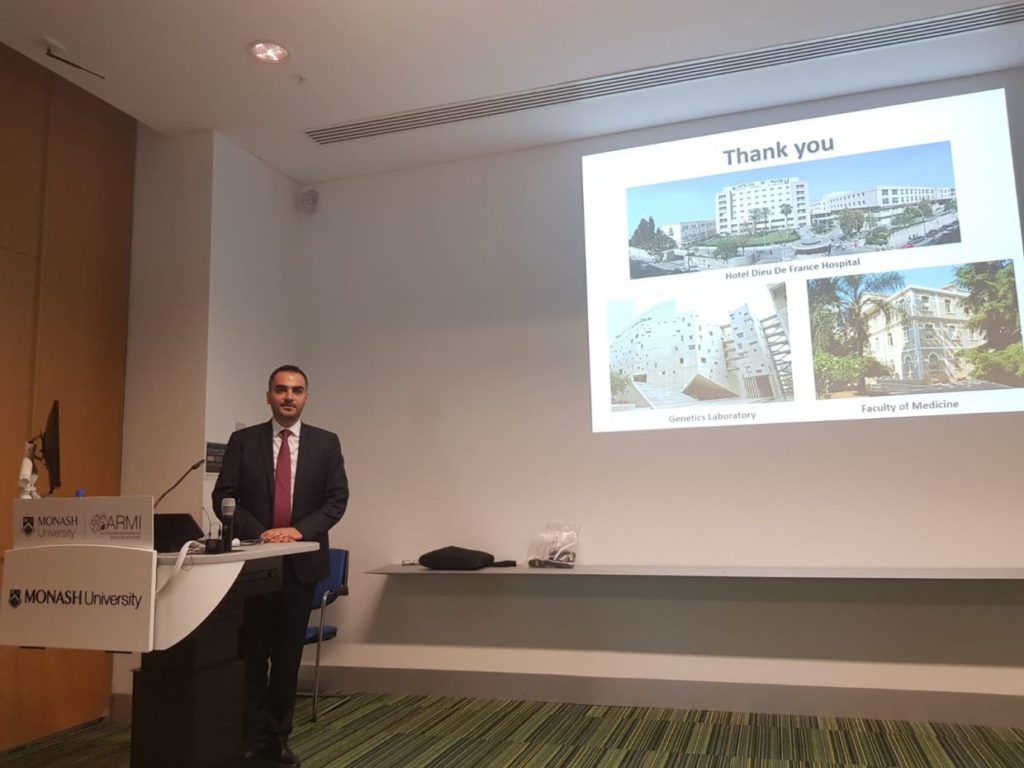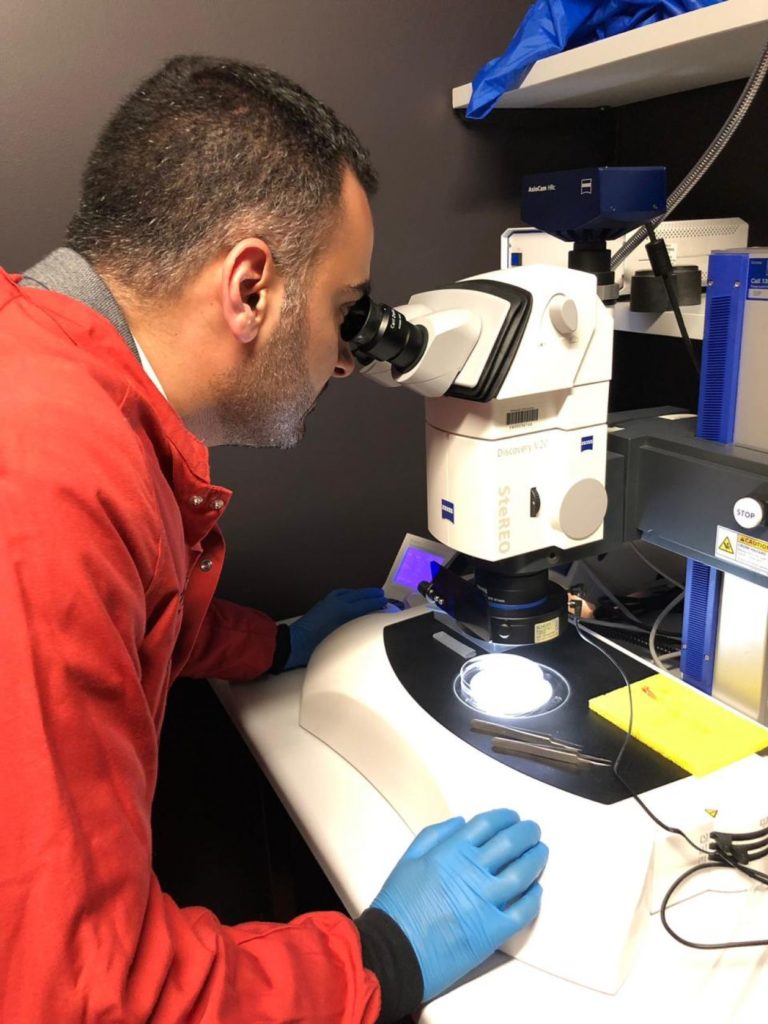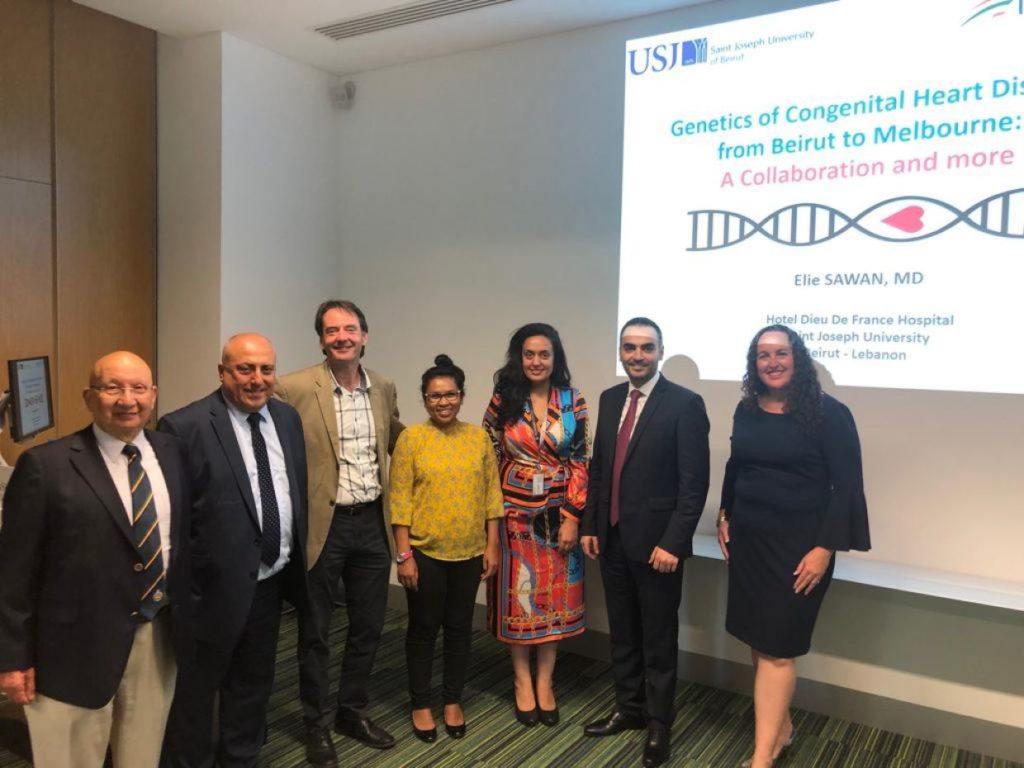From A to B: ARMI and Beirut Researchers Collaborate to Unlock the Genetic Mysteries of Congenital Heart Disease
Last month, the Australian Regenerative Medicine Institute (ARMI) was delighted to host Dr Elie Sawan, the principle Paediatric Cardiothoracic Surgeon from Hôtel-Dieu de France Hospital in Beirut, Lebanon. Dr Sawan delivered an amazing talk to ARMI and Monash University researchers, discussing his work in the field of congenital heart disease. Highlighted in his presentation was how his research forms an integral part of a greater international collaboration with the Ramialison Group at ARMI.

Dr Elie Sawan presents this research on congenital heart disease.
Dr Elie Sawan is one of only three surgeons in Lebanon with the expertise to perform life-saving surgery on newborn babies with congenital heart disease (CHD). This makes him a valuable asset not only to Lebanon, but also to the global CHD research and clinical practice community. However, his work in this field reaches far beyond the walls of the operating theatre, with Dr Sawan also being involved in cardiovascular research projects within the Biomolecular and Genetics Lab at Saint Joseph University. Dr Sawan’s deep and multifaceted passion for improving the lives of people with CHD, a partnership with the Ramialison Group at ARMI made sense and a visit to ARMI was organised to facilitate collaborative work in February 2019.
“This exciting collaborative project brings together world-leading surgical and clinical knowledge and genomics expertise to further our understanding of the genetic factors that are responsible in the development of CHD.”
This exciting collaborative project brings together world-leading surgical and clinical knowledge and genomics expertise to further our understanding of the genetic factors that are responsible in the development of CHD. CHD presents a significant burden to society. It is the most common serious birth defect, affecting 1 in 100 newborns, and it is the leading cause of death in newborn babies. Those affected often need lifelong cardiovascular care. A major barrier in tackling this disease is the fact that the exact cause of 80% of cases is unknown (read more about this here).
How Regenerative Medicine Research Holds the Key to Finding Answers

Dr Elie Sawan visiting the labs at ARMI.
We need answers urgently and this project, which combines Dr Sawan’s unique and powerful patient cohort with the Ramialison Group’s bioinformatics and genetics expertise, has the potential to provide those answers. Over the years as a surgeon, Dr Sawan has built a patient cohort that is big enough for both ARMI and Saint Joseph University researchers to make new and meaningful discoveries. What is special about this patient cohort is that it is ethnically matched, meaning most of the individuals are relatively closely genetically related.
“This [project] gives us the best possible chance at uncovering the genetic causes of 80% of CHD.” – Dr Elie Sawan
“From a human genetics-research perspective, this is the best-case scenario. When the level of natural genetic variation in the cohort is relatively low, the disease-causing mutations are more likely to stand out during genomic analysis,” said Ramialison Group’s Senior Research Officer, Jeannette Hallab, who is at the core of this collaboration. Dr Sawan added, “This gives us the best possible chance at uncovering the genetic causes of 80% of CHD. There is the potential to improve the lives of Australian CHD patients and CHD patients all around the world through improved genetic counselling for affected families and earlier and better diagnostics.”
Fostering Collaboration and Global Networks in Research

ARMI and the Ramialison group are delighted to embark on a collaboration with Dr Elie Sawan.
Not only does this collaboration present an opportunity to make new discoveries, but it also provides a special opportunity for researchers, particularly students, at both ARMI and Saint Joseph University – that of international exchange. This project will enable students to study, work and travel in an international capacity. “Science is an international discipline. Labs in Europe are different to labs in the US, which are different to labs in Australia and so on and so forth. For students, working in a different environment is so important to their professional development,” stated Dr Sawan. Dr Ramialison agreed, further commenting, “exchanges in different countries also helps you to form global networks, which is vital and powerful in academia, especially in today’s intensely connected world. For students, you might find a mentor with a fresh perspective or meet a potential collaborator, opening the door for joint research projects in the future.”
“This international collaboration is one of many at ARMI and highlights the importance of working together…to undertake groundbreaking research with the goal of improving lives.”
This international collaboration is one of many at ARMI and highlights the importance of working together, and combining resources and expertise to undertake groundbreaking research with the goal of improving lives.
To find out more about the vital research being undertaken by the Ramialison Group, read our blog Congenital Heart Disease: How Regenerative Medicine Research is Making a Difference.

More information
The Ramialison Group is studying development and disease. They are a multidisciplinary team of computational and molecular biologists who specialise in genomics, using new genomic technology to delineate the cardiac gene regulatory networks, and to work out what leads to proper heart formation and what causes congenital heart disease. For more information on Dr Mirana Ramialison and the Ramialison Group, please visit the Ramialison Group page. You can contact Dr Ramialison via mirana.ramialison@monash.edu. You can also follow the Ramialison Group on Twitter @ramialison_lab.
Dr Elie Sawan, MD currently occupies the positions of Paediatric Cariothoracic Surgeon at Hotel-Dieu De France University Hospital and Teacher at Saint Joseph University. Dr Sawan has been working as a clinician and surgeon in the field of congenital heart disease for several years and is also involved in cardiovascular research projects within the Biomolecular and Genetics Lab at the University of Saint-Joseph. You can contact Dr Sawan via elie_sawan@hotmail.com.
